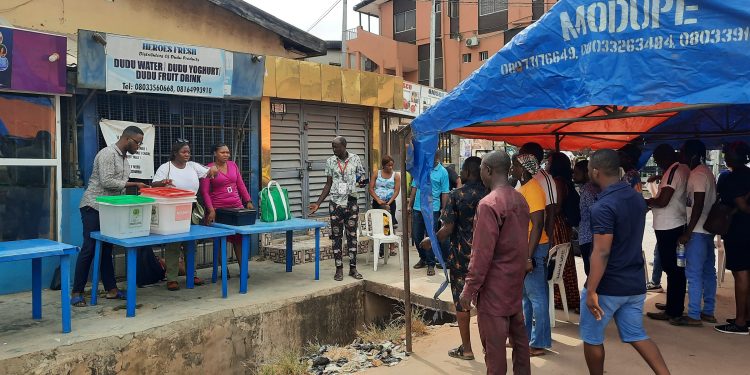The Campaign for Equal Voting Access for Persons with Disabilities (EVAPWD), a program of the Centre for Citizens with Disabilities (CCD) has recommended that the Independent National Electoral Commission (INEC) reviews the deployment of assistive devices to polling units across the country, to ensure that Persons with Disabilities (PWDs) are able to participate in the voting process without any form of barrier.
EVAPWD made the recommendation in its preliminary statement about the 2023 General Elections signed by the Chairman, David Anyaele.
The group deployed election observers across the country to observe provisions made by INEC for PWDs participation in the election; raise awareness on equal voting rights for citizens with disabilities, and to assess the election management body’s compliance to the provisions of the Discrimination against Persons with Disabilities (Prohibition) Act, section 54 of the Electoral Act 2022, INEC Framework on Access and Participation of Persons with Disabilities, and the Nigeria Constitution 1999 as amended.
While the group commended INEC for the smooth conduct of the election, though with hitches in some parts of the country, it noted that it is important that the electoral umpire continue to enhance voting access to PWDs through the provision of assistive devices.
“The significant improvement on accessible polling units as INEC ad-hoc Staff and other voters ensured that PWDs and other vulnerable groups enjoyed priority at the PUs. The pattern of deployment of assistive devices such as Braille guides, shade and magnifying glasses need to be reviewed so as to achieve the objectives of procuring the materials,” the statement reads.
It stressed that “EVAPWD observers observed that the deployment of Braille guides, shade and magnifying glasses were invisible at the PUs visited, as only two Polling Units recorded availability of these items. These PU are PU 05, Ward 3 Naragatu Hausawa, Jos North LGA of Plateau State; and PU 2, Ward 5, Ado Ekiti LGA, Ekiti State; and PU 3, Ward 1 Odoak People, Onitsha South, Anambra State. Observers saw the availability of Canopies which would support persons with albinism at PU 03, Ward 01 Iweku, Eti Osa LGA Lagos State.
“EVAPWD observers observed that form EC40H were also scarce at the Polling Units, as the knowledge of INEC ad-hoc staff around the use of this document is poor. This form was observed at PU 10, Ward 7 Wakili Kudu, Gombe LGA, Gombe State, and PU 07, Ward 5 Gusau LGA, Zamfara State; as well as PU 02, Ward 5 Ibadan LGA, Oyo State. Form EC40H is used by INEC to document the number of voters with disabilities that voted at a particular Polling Unit, Ward, LGA, State and across the Federation.
“However, our observers found that the visibility of Voting Guides for the Deaf voters in a significant number of the Polling Units visited in Lagos State.”
Also, the group expressed delight that marginalized persons were given priority voting in many polling units and some were also accessible to many PWDs.
“EVAPWD is impressed to observe that marginalized populations – the aged, nursing mothers and pregnant women and persons with disabilities were offered priority voting in most of the polling units observed,” it added.
On the contrary, EVAPWD said it “is disturbed that a significant number of Polling Units observed were not accessible. These include: PU 01, Ward 2 Asata Township Ward, Enugu South, LGA, Enugu State; PU 10, Ward 03 Gawuna, Nasarawa LGA, Kano State; PU 002, Ward 6 S/Paure/S/Mafarawa, Kaura Namoda LGA, Zamfara State; PU 03, Ward 6 Ikoyi, Lagos State; PU 04, Ward 2, Port Harcourt LGA, Rivers State; and PU 6, Ward 5, Uyo LGA Akwa Ibom State.
“These Polling Units were not accessible to persons with disabilities as they were placed across gutters or in schools, public buildings with steps and high pavements. What this means is that voters with physical disabilities would be scared to go to these hard to access environments to cast their votes.”

